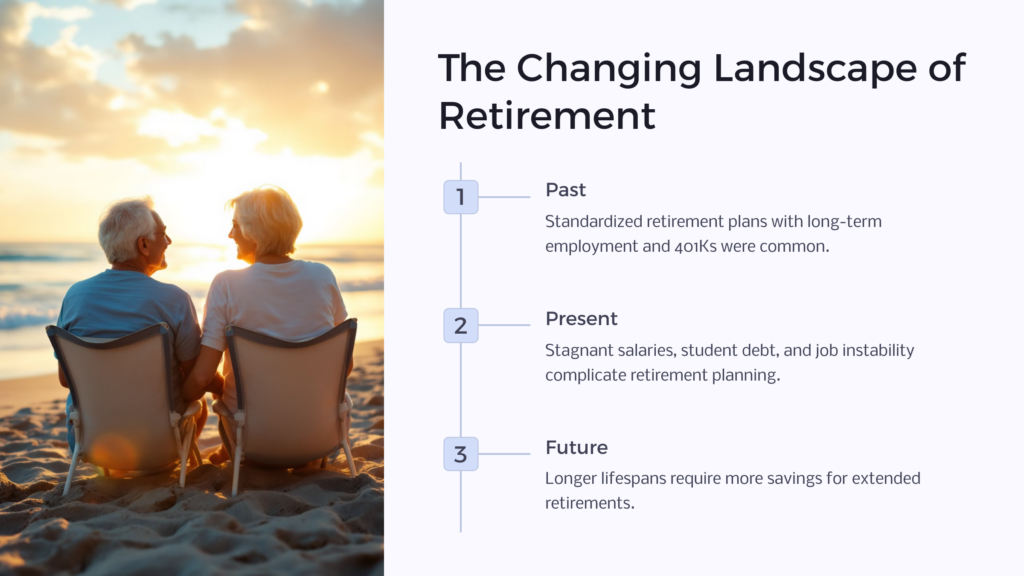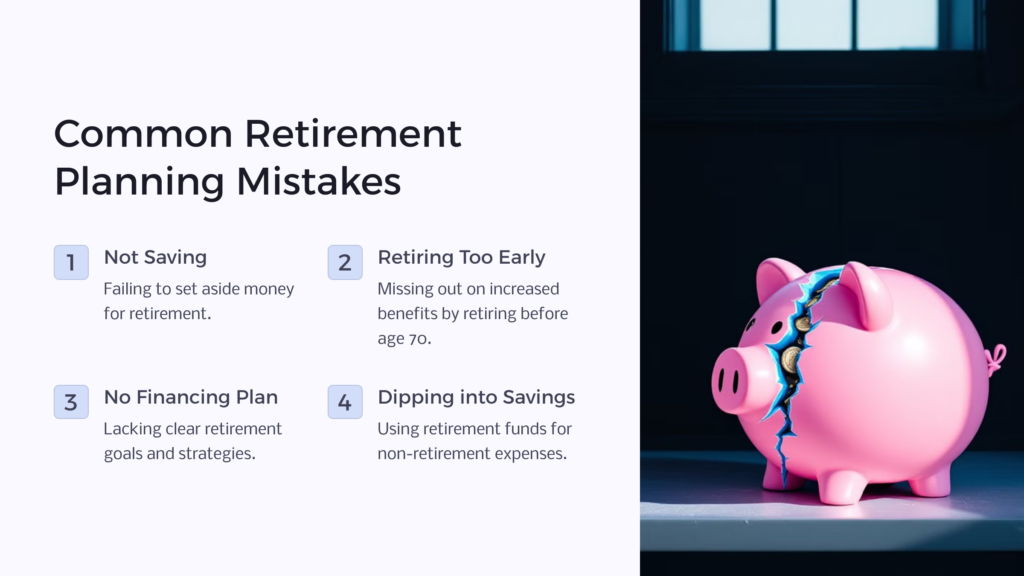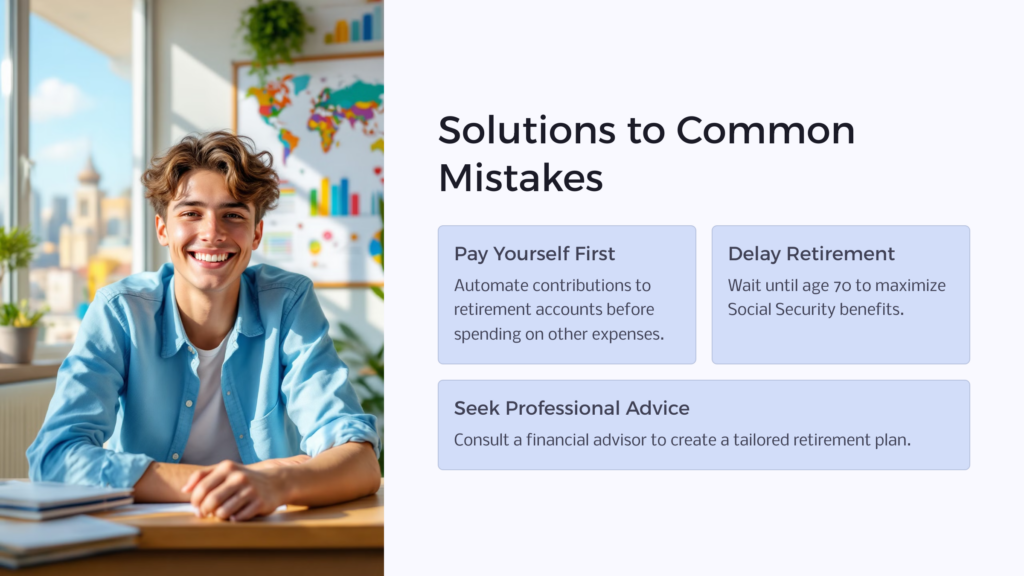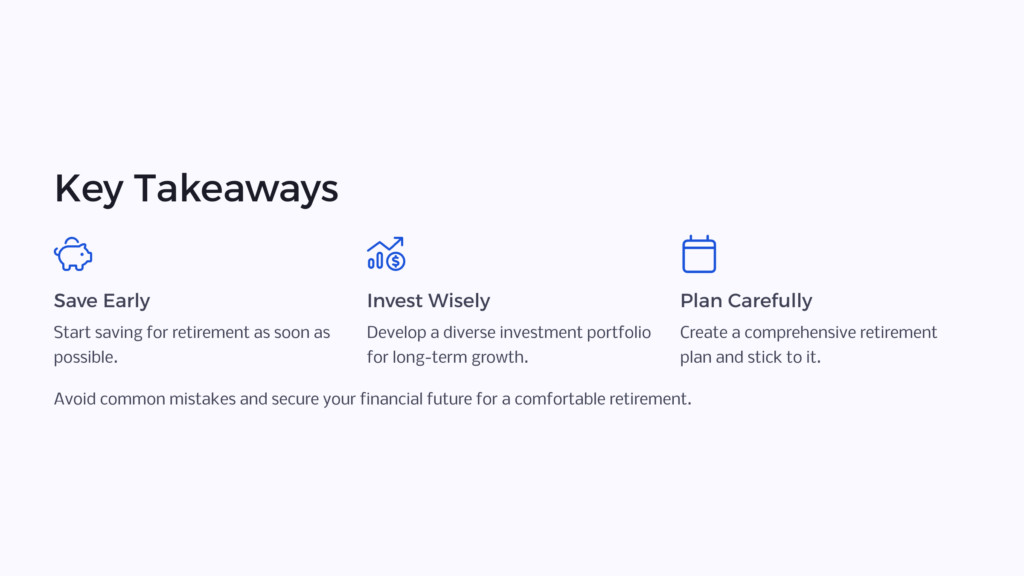At some point, almost everyone will need to retire. Unfortunately, even though retirement is inevitable, most Americans are woefully unprepared—a problem that has only increased among Americans. With some careful planning, you can avoid some common mistakes.
7 Common Requirement Planning Mistakes to Avoid
- Not Saving
- Retiring Too Early
- No Financing Plan
- Dipping into Savings
- No Investment Portfolio
- Accumulating Too Much Debt
- Expecting to Rely on Social Security
For decades, American workers had a fairly standardized notion of a retirement plan. You got a job right out of college, worked at the same company for four decades, and allocated a portion of your regular paycheck to a company-sponsored 401K, perhaps with some company matching contributions. At age 65, you retired and began to collect Social Security, supplemented by the nest egg you had built up with regular contributions to mutual funds or a managed money account.

Unfortunately, this picture has become much more complicated over the years. Salaries have remained stagnant while the cost of college tuition has risen, creating a crisis on the horizon of students who are graduating with debt they can never catch up to. Adding to this issue is a new corporate culture where long term engagement with one workplace is no longer the norm. Inflation has driven up the cost of goods, and Americans have turned to funding lifestyles just slightly out of their reasonable reach with credit card debt.
But there’s more. With advances in medical care, people are living longer lives, which means longer retirement. In times past, a retiree might only need 3-5 years of money laid out to live comfortably, whereas now, a retiring individual will need to either work longer or have more money set aside to cover the expenses of retirement for as many as 2-3 decades. Fortunately, there is a solution to this problem. It just requires a little planning and discipline…and avoiding these mistakes at all costs.
7 Common Requirement Planning Mistakes to Avoid
Each one of these common retirement planning mistakes has a silver lining to the cloud. There are simple solutions you can engage with to create a long-term investment plan that will facilitate a comfortable retirement.

1. Not Saving
The first mistake that American workers make is not saving money. Economists have argued that this is in part to the reduced spending power of disposable incomes, but spending habits are also to blame. The average American home has at least two vehicles. It’s considered a cultural norm to go on vacation once a year. Weekend entertainment of dinner out on the town and a movie might rack up to as much as $200 for a family of four. Remember the adage of Benjamin Franklin and its converse: a penny spent…is a penny not saved.
The solution to these problems is simple: Pay yourself first. If you get a paycheck, nominate a portion of that check for an automatic contribution to your 401K. If you are self-employed, open up a Roth IRA and contribute money into the account before you deposit the remainder in your checking account.
Another backhanded way to engage in retirement saving is to purchase life insurance and then later turn it into a variable annuity. In basic terms, this means that the life insurance company will give you a periodic payment instead of you paying them. While you once paid a monthly premium to an insurance company banking on the probability that you would live to pay more premiums, annuities are their gamble that payees will pass on before collecting their next payment. Though it seems morbid, it’s actually a great way to construct a savings vehicle for the future and pay for life insurance at the same time.
2. Retiring Too Early
 Another mistake that retirees make in terms of retirement planning is that they retire too early. While it’s true that you can retire at age 62, the longer you wait, the higher of a monthly retirement benefit payment you’ll get. For example, if you retire at age 70, you’ll get 132% of your monthly benefit.
Another mistake that retirees make in terms of retirement planning is that they retire too early. While it’s true that you can retire at age 62, the longer you wait, the higher of a monthly retirement benefit payment you’ll get. For example, if you retire at age 70, you’ll get 132% of your monthly benefit.
To give some concrete numbers as an example, if you retire at age 62, the most you can collect is $2,265 per month. If you retire at full retirement age (which varies based on your birth year) you can collect up to $3,011 per month. But if you retire at age 70, you can collect up to $3,790 per month—so waiting eight years to retire can land you up to an additional $18,300 per year.
3. No Financing Plan
One of the most common classic retirement planning mistakes is to not have a retirement plan. Many individuals don’t think that far ahead, so they remain unaware of what steps they need to take today. By contrast, if they outlined some concrete goals about how old they want to be when they retire and how big they want their nest egg to be, they would know how much money they need to put away every month.
Some people find it useful to meet with a certified financial advisor or financial planner who can discuss your life goals with you, and how those aspirations—funding college for the grandkids, leaving behind a charitable legacy, building a dream home, or traveling the world—will translate into financial goals. This type of financial planning can be difficult for the average person to do, as it necessitates navigating the complexities of creating a tailored investment plan, so working with a financial professional can go a long way in this regard.
4. Dipping into Savings
It can be tempting to dip into savings for something you really want, like a bigger home, a nice vacation, or a new vehicle. Unfortunately, dipping into your retirement savings can be downright disastrous, as the taxes for withdrawing money before a certain age—for example, with tax deferred retirement accounts like a Roth IRA—can be very steep. There are certain tax discounts offered to first time home buyers who may need to leverage the money accumulated in their retirement account in order to close on a home in question, but this decision should be evaluated very carefully.
5. No Investment Portfolio
Saving up for retirement by putting money into a savings account or even a CD is another bad idea. The reason is simple: Due to inflation, money loses its value over time. You will simply just not be able to grow your contributions into a seven-figure nest egg if you don’t have compound interest working in your favor. By contrast, if you have your retirement contributions invested in the stock market and managed by a competent money manager or placed into mutual funds with stable long-term growth, you can see anywhere from an 8-13% increase.
6. Accumulating Too Much Debt
Debt makes it nearly impossible to save. Not only do you have to pay back what you borrowed, but you have to pay interest as well. Unfortunately, debt financing has become part of the American Dream. Americans use debt to purchase a home, pay for a college education, buy vehicles, and even purchase everyday items. Credit card companies and banks try to encourage spending by rewarding customers with points or cash back, which only encourages bad spending habits. The solution is really quite simple: Limit the amount of debt in your life as much as possible.
7. Expecting to Rely on Social Security
It’s true that a retiree will collect a monthly Social Security benefit payment, but this is not a good strategy for a secure retirement. Cautious retirees who begin collecting Social Security at age 70 will see an additional cash flow of over $1800 annually. But the mistake of relying on Social Security begins with the fact that you may be thrust into an unplanned retirement sooner than you’d like. If your retirement strategy involved relying on Uncle Sam alone, you might be getting (for example) $2,265 each month instead of $3,011. It’s a risk you really cannot afford to take if you want a comfortable retirement.
But even if things go as planned, the retirement income of Social Security alone may not be enough to cover additional surprise retirement costs like medical expenses. That’s why it’s crucial to have a retirement fund and retirement goals—so that you won’t have to pinch pennies in your retirement years. If you were used to an annual salary of six figures, or even something more moderate like $60,000 annually, then relying on $36,000 of retirement benefits to cover your expenses will not make for an easy retirement, and may throw you into financial or medical danger if you are unable to pay for necessary treatments or expenses.
When Should I Retire?

The answer to this question is not just about money. You will have to consider other factors like your health. In some cases, your employer will bump you out of the workforce earlier than you’d like, and you may find it hard to secure similarly paying employment in the latter years of your career. This is why it’s so important to have retirement plans, so you don’t need to rely on the good graces of others for financial security in your twilight years.
As mentioned, if you can delay retirement as long as possible, you’ll also get more money when you do retire. Depending on your age, your full retirement year will vary, but in 2020 if you retire then you will only collect up to $3,011 each month. If you retire at age 62, that number goes lower to $2,265. But if you can delay your retirement to age 70, you’ll get 132% of the amount you’d get at full retirement: up to $3,790 per month. Remember the difference between retiring at age 62 and 70 is as much as over $18,000 per year. If you live for 10 years after retirement, that’s a full six figures, almost twice over.
It’s important to consider these factors because retirement will have its surprises. With longer lifespans, there may be more medical issues to address, and the possibility of in-home or nursing home care. Having a plan and retiring at the right time can be the difference between being able to cover your expenses and placing undue stress on your working children. Having a thought-out plan can also mean that after you pass on, you’ll have something to pass on to the next generation.
Retirement Planning Mistakes
Retirement is inevitable. Keep in mind that in order to retire comfortably, you will need a plan, and part of that plan will involve avoiding these typical retirement mistakes. The good news is that each and every one of these classic retirement planning mistakes has an easy fix. You will just need discipline and dedication to effectively leverage these solutions.

 Benefits.com Advisors
Benefits.com Advisors
With expertise spanning local, state, and federal benefit programs, our team is dedicated to guiding individuals towards the perfect program tailored to their unique circumstances.
Rise to the top with Peak Benefits!
Join our Peak Benefits Newsletter for the latest news, resources, and offers on all things government benefits.



















